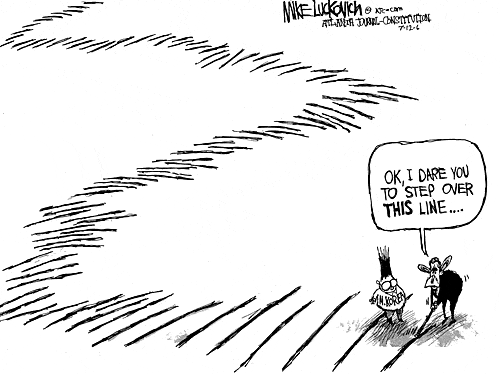There has been a lot of criticism of Israel for what is characterized as its
disproportionate responses to the cross-border incursions and kidnappings perpetrated by Hamas and then by Hezbollah. If you are interested, much of this criticism is catalogued in an
article posted yesterday on the Zionist Organization Of America website, which, of course, considers such criticism to be evidence of the perfidy of Israel's so-called "friends."
Every one of these statements also blamed Hezbollah for starting things, condemned Iran and Syria for supporting Hezbollah and confirmed Israel's right to defend itself from such attacks. Even some of Israel's traditional enemies
joined in criticizing Hezbollah as well as Israel.
Yet the opinion pieces from Israel's American supporters chose to largely ignore these facts and to portray the criticism as an attack on Israel's right to respond at all:
Washington Post,
Charles Krauthammer,
Wall Street Journal,
Max Boot,
James Taranto,
Charles Krauthammer(again),
etc.
But the disproportionality is so overwhelming that even the Israeli PR machine cannot keep it out of the news sections:
Dozens more die as air strikes continue,
Dazed Refugees Flood Beirut,
Beirut: City Of Ruins,
Large-Scale Evacuations From Lebanon Begin etc. Yes, Israelis are suffering and dying too, but some statistics reported in
today's NY Times brings the relative suffering into perspective:
The asymmetry in the reported death tolls is marked and growing: some 230 Lebanese dead, most of them civilians, to 25 Israeli dead, 13 of them civilians. In Gaza, one Israel soldier has died from his own army's fire, and 103 Palestinians have been killed, 70 percent of them militants.
In addition, Israel has disabled the Lebanon's only commercial airport, blockaded its ports, and destroyed fuel tanks, power plants, gas stations, lighthouses, bridges, roads and innumerable homes and businesses in both Lebanon and Gaza. It has even bombed a Lebanese Army base -- the same army it insists should be disarming Hezbollah. Nothing even remotely similar to this is occurring in Israel.
With the disproportionality so blatant and undeniable, Israeli apologists have taken a new tack: they are defending it, arguing that other countries would do the same thing, probably even worse. As reported in the same NY Times article today:
Referring to complaints that Israel was using disproportionate force, Dan Gillerman, Israel's United Nations ambassador, said at a rally of supporters in New York this week, "You're damn right we are. If your cities were shelled the way ours were," he said, addressing critics, "you would use much more force than we are or we ever will."
In a
USA Today op-ed piece, Newt Gingrich makes this argument as well:
Imagine that this morning 50 missiles were launched from Cuba and exploded in Miami. In addition to buildings and homes being destroyed, scores of Americans were being killed. Now imagine our allies responded by saying publicly that we must not be too aggressive in protecting our citizens and that America must use the utmost restraint.
Our history shows us that we, as Americans, would reject such bad advice. After all, we have never reacted to a direct attack on our soil with any restraint. Every time America has been attacked by an enemy, we set about defeating it and ending the threat.
There is considerable truth to this. One need not go back to World War II for an example; one need only consider our response to the 9/11 attacks. Far from showing restraint, we invaded and occupied two entire countries, bringing to each civilian casualties and destruction of property far in excees of what we ourselves suffered -- and far in excess of what the Israelis are inflicting on either Lebanon or Gaza.
But the analogy contains its own rebuttal: as we ourselves have proved, such disproportionality just . . . does . . . not . . . work in these types of struggles. Yes, it did work in WW II, the "lessons" of which continue to cloud our thinking about today's world. But with regard to the Muslim world, I know of no instance where the application of "overwhelming force" has produced anything other than more, and more barbaric, violence. To the contrary, the Russian experience in Afghanistan and Chechnya, our own experience in Afghanistan and Iraq and -- most of all -- Israel's experience in its 40 year struggle with the Palestinians, demonstrate, I think conclusively, that in these kinds of struggles overwhelming force is not just doomed to failure, it is like trying to douse a fire with gasoline.
The human suffering that Israel is inflciting on the Lebanese is offensive, but what makes it offensive has less to do with issues of proportionality than it does with the fact that it is gratuitous. We can accept disproportionate violence and casulaties and the suffering and deaths of innocents if (and so long as) we believe that something worthwhile will result in the end. We Americans still have some hope that our own acts of disproportional violence in Iraq and Afghanistan may yet prove to have been "worth it;" at least, we did not know in that our actions would only make matters worse. That cannot be said for the Israelis. After 40 years of fighting, nothing in their experience provides them with even the smallest inkling of belief that the suffering they are imposing on others will dampen the ardor or blunt the effectiveness of their enemies. As such, the violence is not really a calculated step taken reluctantly in the hope of a better future. It is simply an act of rage born of frustration.
So what is the alternative? I don't know. That's the problem. No one seems to know, so we and the Israelis and the Russians and everyone else caught up in the struggles with the Muslim world keep doing the same things over, and over and over again. With the same sorry results. I don't know what the answer is, but I do know this: We have to, we
must, find some better way of dealing with these types of adversaries. "Overwhelming force" is not the answer.











